Australia fires: Military to be deployed to help rescue effort
Australian military aircraft and vessels will be deployed to help emergency services in the fire-ravaged states of New South Wales (NSW) and Victoria.
Thousands of people fled to beaches in the south-eastern states on Tuesday as emergency-level fires spread.
In Mallacoota, Victoria, about 4,000 people sought shelter on the coast.
Two more people have been confirmed dead in NSW, bringing the fire-linked death toll to 12.
Authorities say four people are missing in Victoria and another in NSW.
"We've got literally hundreds, thousands of people up and down the coast, taking refuge on the beaches," said Shane Fitzsimmons, commissioner of the NSW Rural Fire Service.
Mr Fitzsimmons said it was "the worst fire season we have experienced here in NSW".
- The sacrifices of Australia's firefighters
- A visual guide to Australia's bushfire crisis
- Sydney mayor defends New Year fireworks
Prime Minister Scott Morrison and Defence Minister Linda Reynolds have agreed to send military aircraft and vessels at the request of the Victorian government.
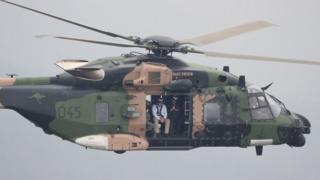
Getty Images
PM Scott Morrison flies over bushfires in NSW on 23 December
The Australian Defence Force will send Black Hawk and Chinook helicopters, fixed-wing aircraft and navy vessels to Victoria and NSW, the two worst-affected regions.
The military is expected to provide humanitarian assistance and carry out evacuations if needed in the coming days.
The US and Canada have also been asked to provide "specialist aviation resources" to help the emergency effort.
![]()
In his New Year message, Mr Morrison hailed the "amazing spirit of Australians" but warned that the weeks and months ahead would "continue to be difficult".
The bodies of the latest victims - a 63-year-old man and his 29-year-old son - were found near the town of Corbargo in NSW.
Police said the men, named as Robert Salway and his son Patrick by Australian media, had stayed behind to protect their family home, where their bodies were found on Tuesday.
In Mallacoota, the local fire service said a change in wind direction had taken the worst of the fires away from the town.
"I understand there was a public cheer down at the jetty when that was announced," said chief officer Steve Warrington.
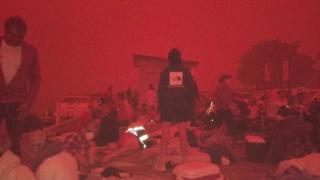
PETER HOSKIN
Locals were left sheltering on the beach at Mallacoota on Tuesday morning
About a dozen "emergency-level" blazes stretch across NSW and Victoria.
Several holiday spots along the coast have been cut off and the main road in the region - the Princes Highway - has been closed.
Temperatures exceeded 40C (104F) in every state and territory at the start of the week, with strong winds and lightning strikes bolstering the flames.
Meteorologists say a climate system in the Indian Ocean, known as the dipole, is the main driver behind the extreme heat in Australia.
What has happened in Mallacoota?
Residents fled to the beach or took up shelter in fortified homes when they heard the warning siren go off at 08:00 local time on Tuesday.
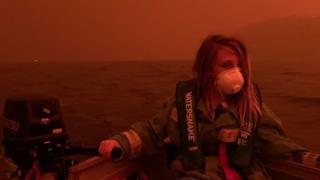
ABC NEWS
One woman shared this picture of her young son wearing a mask and life jacket as the family fled on to a boat to escape the blaze at Mallacoota
"It should have been daylight but it was black like midnight and we could hear the fire roaring," said David Jeffrey, a local business owner. "We were all terrified for our lives."
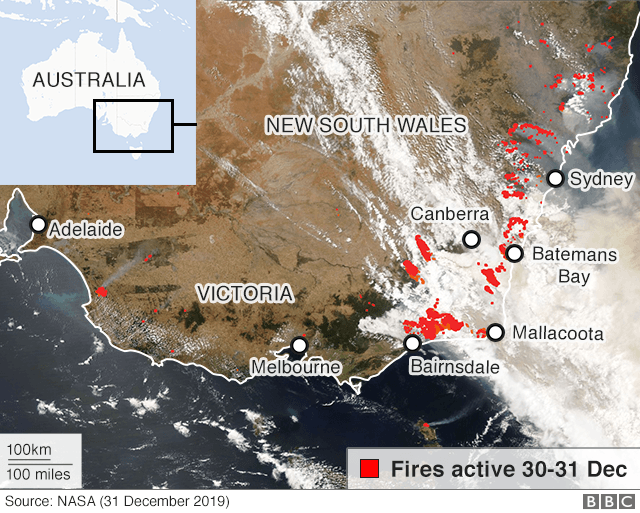
NASA/BBC
The fire was kept back from the shore, where firefighters had gathered for a last line of defence, by the change in wind.
Victoria's state emergency commissioner Andrew Crisp told reporters there were "4,000 people on the beach".
Many of those trapped on the beach could be forced to spend the night there.
Fire chief Warrington said there had been "significant property losses" across the entire East Gippsland region in the past days.
Authorities said bushfire had destroyed 43 properties in Gippsland, where more than 400,000 hectares have been burned.
Hundreds of massive blazes have destroyed millions of hectares in the eastern states of Australia since September.
![]()
- Are you affected by the fires? Let us know by emailing haveyoursay@bbc.co.uk
![]()
Residents in the NSW holiday towns of Bermagui and Batemans Bay also fled on Tuesday morning to the waterfront or makeshift evacuation sites near the shore.
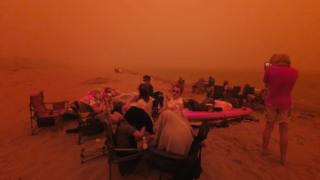
ALASTAIR PRIOR
Residents of Batemans Bay in NSW also headed to the water for safety
Locals told the BBC they had "bunkered in" as the front approached, raining ash on the beaches.
"It was bloody scary. The sky went red, and ash was flying everywhere," said Zoe Simmons in Batemans Bay.
A "freakish weather event" killed a volunteer firefighter on Sunday, according to the NSW Rural Fire Service (RFS). He was the third volunteer firefighter to have died.
Samuel McPaul, 28, was a newlywed who was expecting his first child. Powerful winds near the NSW-Victoria border - generated by the fires - lifted his 10-tonne truck off the ground and flipped it over, the service said.
'Ground blanketed in ash'
Lucy Martin, BBC News, Merimbula
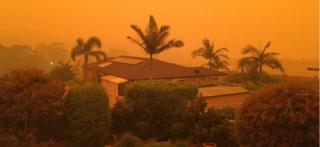
For many Australians, the final days of 2019 have been a tense and worrying time. The smoke hanging in the sky day after day is a constant reminder of communities on fire.
Some are staying inside to avoid the thick, acrid smoke, while others are cancelling holidays or taking long detours to avoid roadblocks.
Here in Merimbula, on the New South Wales coast, the sun has been blotted out, casting a deep orange haze in the sky. People on the street are describing it as apocalyptic.
The smoke is now so thick it's almost impossible to drive. The ground is blanketed in ash and supermarkets are packed with people stocking up with supplies.
Holidaymakers should be swimming and hiking today, but they're checking into evacuation centres or planning escape routes.
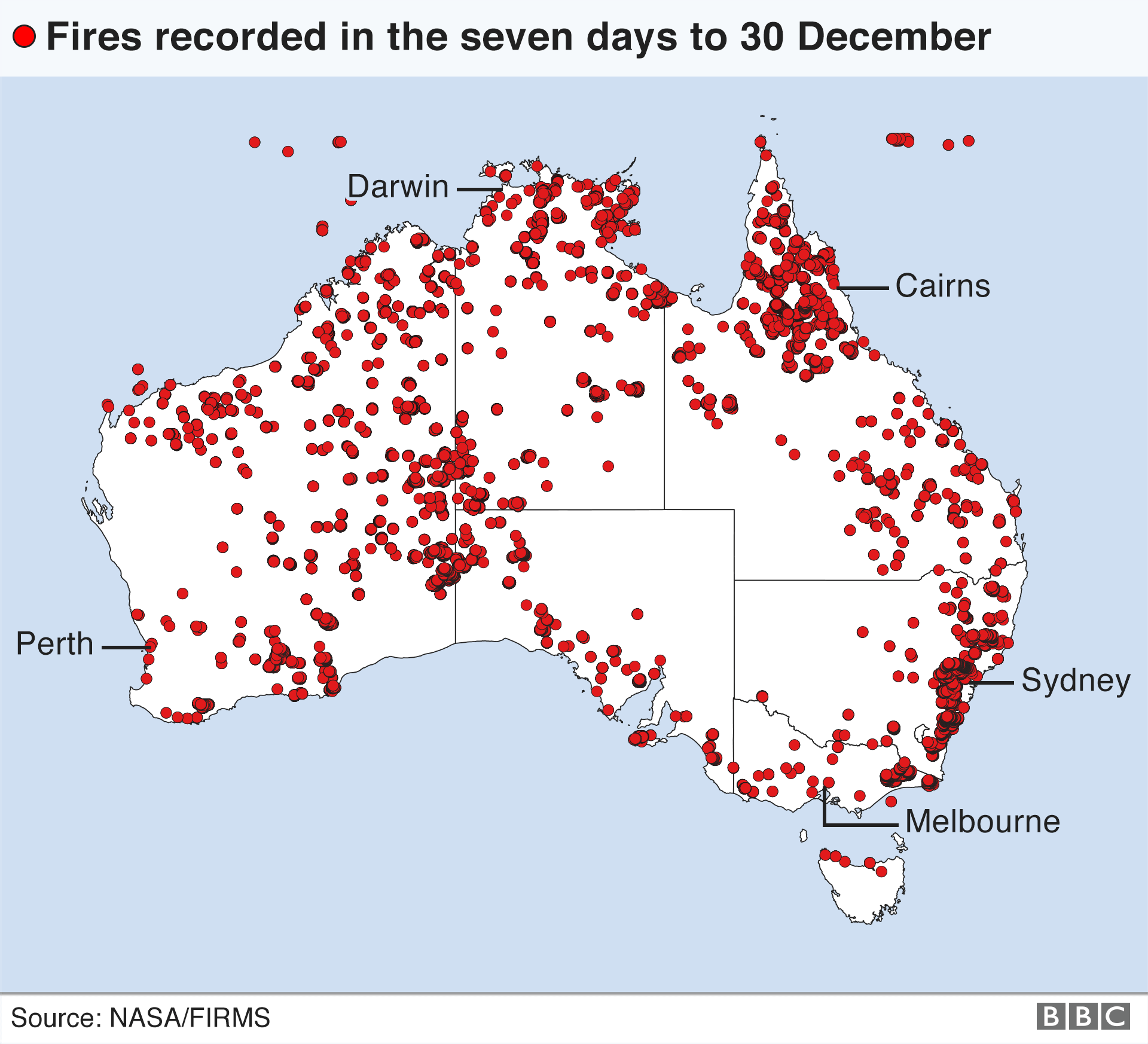
Have you been told to evacuate? Email haveyoursay@bbc.co.uk.
Please include a contact number if you are willing to speak to a BBC journalist. You can also contact us in the following ways:
- WhatsApp: +44 7756 165803
- Tweet: @BBC_HaveYourSay
- Send pictures/video to yourpics@bbc.co.uk
- Upload your pictures / video here
- Text an SMS or MMS to 61124 or +44 7624 800 100
- Please read our terms & conditions and privacy policy



Recent Comments